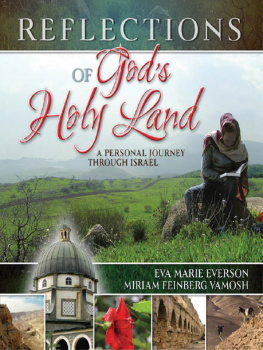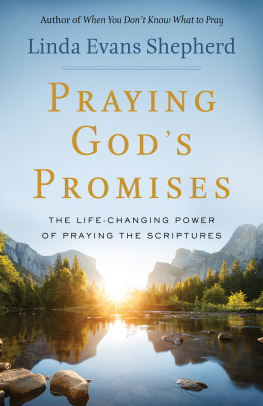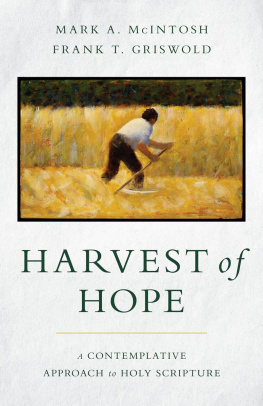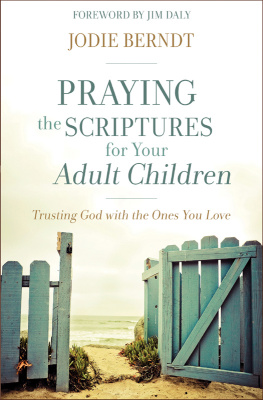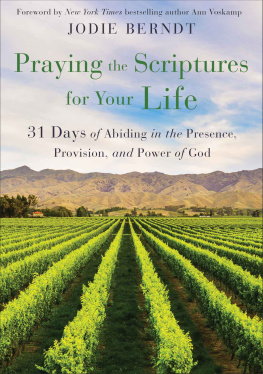M. Basil Pennington - Praying the Holy Scriptures
Here you can read online M. Basil Pennington - Praying the Holy Scriptures full text of the book (entire story) in english for free. Download pdf and epub, get meaning, cover and reviews about this ebook. year: 2012, publisher: Paraclete Press, genre: Religion. Description of the work, (preface) as well as reviews are available. Best literature library LitArk.com created for fans of good reading and offers a wide selection of genres:
Romance novel
Science fiction
Adventure
Detective
Science
History
Home and family
Prose
Art
Politics
Computer
Non-fiction
Religion
Business
Children
Humor
Choose a favorite category and find really read worthwhile books. Enjoy immersion in the world of imagination, feel the emotions of the characters or learn something new for yourself, make an fascinating discovery.

- Book:Praying the Holy Scriptures
- Author:
- Publisher:Paraclete Press
- Genre:
- Year:2012
- Rating:4 / 5
- Favourites:Add to favourites
- Your mark:
- 80
- 1
- 2
- 3
- 4
- 5
Praying the Holy Scriptures: summary, description and annotation
We offer to read an annotation, description, summary or preface (depends on what the author of the book "Praying the Holy Scriptures" wrote himself). If you haven't found the necessary information about the book — write in the comments, we will try to find it.
Discover how to listen for Gods voice as you read the Holy Scriptures.
Praying the Holy Scriptures — read online for free the complete book (whole text) full work
Below is the text of the book, divided by pages. System saving the place of the last page read, allows you to conveniently read the book "Praying the Holy Scriptures" online for free, without having to search again every time where you left off. Put a bookmark, and you can go to the page where you finished reading at any time.
Font size:
Interval:
Bookmark:
ANCIENT SPIRITUAL DISCIPLINES
the Holy
Scriptures
M. Basil Pennington, OCSO

Praying the Holy Scriptures
2012 First Printing
This book is excerpted from Seeking His Mind, Forty Meetings with Christ, copyright 2002 by M. Basil Pennington, OCSO.
Copyright 2012 by St. Josephs Abbey
ISBN: 978-1-61261-141-9 (Pack of Five)
Unless otherwise designated, Scripture quotations in this work are taken from the New Revised Standard Bible, 1989, Division of Christian Education of the National Council of the Churches of Christ in the United States of America. Used by permission. All rights reserved.
Scripture excerpts designated (NAB) are taken from the New American Bible with Revised New Testament and Revised Psalms 1991, 1986, 1970 Confraternity of Christian Doctrine, Washington, D.C. Used with permission. All Rights Reserved. No part of the New American Bible may be reproduced in any form without permission in writing from the copyright owner.
Scripture quotations marked (NIV) are taken from the Holy Bible, New International Version. NIV. Copyright 1973, 1978, 1984 by Biblica, Inc. Used by permission of Zondervan. All rights reserved worldwide.
10 9 8 7 6 5 4 3 2 1
All rights reserved. No portion of this book may be reproduced, stored in an electronic retrieval system, or transmitted in any form or by any meanselectronic, mechanical, photocopying, recording, or any otherexcept for brief quotations in printed reviews, without the prior written permission of the publisher.
Published by Paraclete Press
Brewster, Massachusetts
www.paracletepress.com
Printed in the United States of America
Let the same mind be in you that was in Christ Jesus,
who, though he was in the form of God,
did not regard equality with God
as something to be exploited,
but emptied himself,
taking the form of a slave,
being born in human likeness.
And being found in human form,
he humbled himself
and became obedient to the point of death
even death on a cross.
PHILIPPIANS 2:58
A Christian Way to
Transformation
Transformation
ANY ONE WHO HAS BEEN IN LOVE OR who has had a close friendship will understand. I look forward every day to meeting the Lord in lectio. It is a time of intimacy, of heart to heart. We know the Lord is truly present in his inspired Word. Here I find him and eagerly wait to hear what he has to say to me. Speak, Lord, your servant, your friend, your disciple, wants to hear. I never know what he is going to say. And oftentimes he does quite surprise me.
His gift is always a word of life, whether it is an immediate flash of light or a word I must carry with me for a time before it shines forth. This is the excitement of lectio. Through his word, I see things differently.
Lectio, or lectio divina, is for the Christian a whole process summed up in four words: lectio, meditatio, oratio, and contemplatio. This process is geared towards a transformation of consciousness and life. Let this mind be in you which was in Christ Jesus, says St. Paul. Our aim is to have the mind of Christ, the nous Christou, to see things, to evaluate all things, to respond to reality in the way Christ our Lord and Master doesto see things as God sees them.
Let me develop this process.
Lectio does not simply mean reading, even though that is its literal translation. We are speaking of a way of Christian spirituality that prevailed through many centuries when the vast number of Christian people could not read. I think lectio here can most properly be understood as meaning to receive the revelation. We Christians, sharing this in part with our Jewish brothers and sisters, are sons and daughters of the Book. And God, who of old spoke first through the creation and then through the prophets, has in these last days spoken to us through his incarnate Son, our Lord Jesus. Lectio most properly resides in hearing the word of God.
In an earlier period, memories seem to have been sharper, or were used more. It was not uncommon for an average Christian to know by heart extensive passages of Scripture, perhaps even the whole of the Gospels and the Psalter. Men like the venerable Abbot Bernard of Clairvaux were reputed to know the whole Bible. These Christians, then, always carried the Scriptures with them and at any moment, drawing on memory, could hear the word of God.
The word of God revealed itself in other ways, too: in the shared faith of sisters and brothers. The Reformers laid great stress on the sermon, as did the Fathers, whose great sermons have come down to us. Faith is also shared in less formal settings, in small groups, or in the one-to-one encounter. Out of our experience of the word, enlightened by the Holy Spirit, we speak the word to one another.
The word can be heard through other media. Music, certainly. Powerful hymns repeat themselves insistently within us: Amazing grace, how sweet the sound. Art, the frescoes, icons, and stained glass windows. The earliest Christian assemblies, gathering in homes and catacombs, adorned the walls of their meeting places with scenes from the Scriptures. Our eastern Christian sisters and brothers find a real presence in icons and enshrine them in their homes as well as in their churches. The whole of the Scriptures is depicted in the windows of the great medieval cathedrals, such as Chartres.
The Master Artist does not cease to reveal himself in his masterpiece, the creation. As St. Paul reminded the Romans, for the mind that would see, God has always been there to be seen. Bernard of Clairvaux is noted for the saying that has been rendered into rather trite English: I have found God more in the trees and the brooks than in the books. Above all does God reveal himself in that which is greatest in all creation, his own image and likeness, the graced person. In others, and in our very selves, we can experience the goodness and love of God, God himself, if we would but be still and know that he is God.
In colloquial English we have the expression: I read you. It implies that I fully get what someone is trying to convey to me. This is perhaps a good translation of lectio, to read in this sense: to get God and all he is saying in all the many ways he is speaking.
Lectio, then, does not necessarily mean sitting with a book. It can mean looking at a work of art, standing before an icon, listening to a friends word of faith, or taking a walk, letting the beauty of the creation, which often lies beneath layers of sins ugliness, speak to us. But for most of us, the most constant, chosen, and privileged hearing of the word will be when we sit daily with the Book, the inspired Word of God.
I WOULD LIKE AT THIS POINT TO TAKE A few minutes to share a very simple and practical way of doing our daily lectio. This simple method comes from the age-old practice of the monks and nuns as expressed in their customaries. I will present it in three points, for that seems a very traditional way to do it and aids memory.
1. Come into Presence and call upon the Spirit. The old monastic usages say that when a nun or monk is going to do lectio, she or he takes the Holy Scriptures, kneels, prays to the Holy Spirit, reads the first sentence, and then reverently kisses the sacred text. We have two elements here: coming into the presence of God dwelling in his inspired word, and asking his Holy Spirit to help us in our lectio.
Next pageFont size:
Interval:
Bookmark:
Similar books «Praying the Holy Scriptures»
Look at similar books to Praying the Holy Scriptures. We have selected literature similar in name and meaning in the hope of providing readers with more options to find new, interesting, not yet read works.
Discussion, reviews of the book Praying the Holy Scriptures and just readers' own opinions. Leave your comments, write what you think about the work, its meaning or the main characters. Specify what exactly you liked and what you didn't like, and why you think so.


